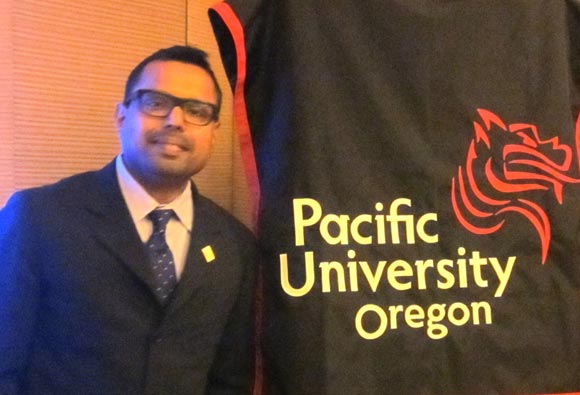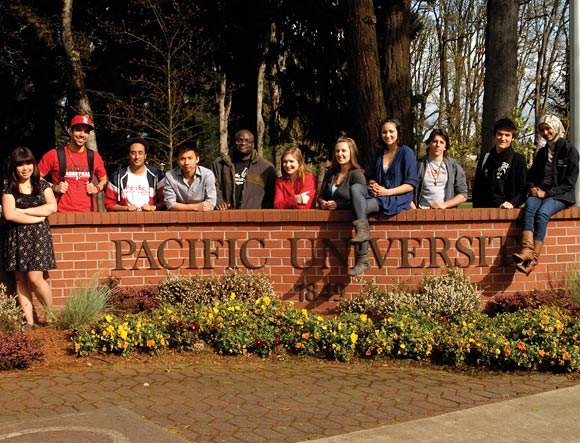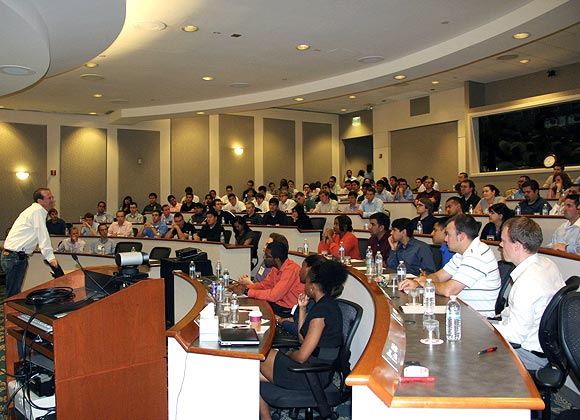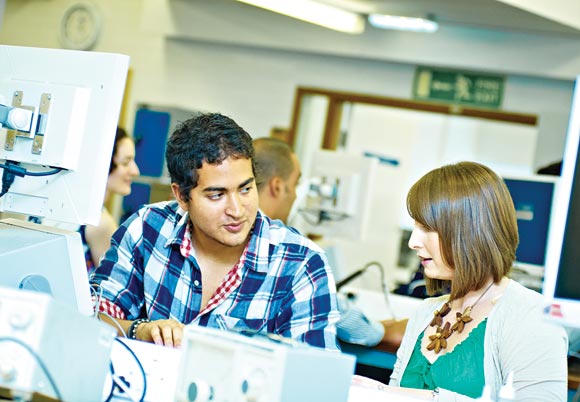 | « Back to article | Print this article |
'Indian parents are worried about return on investment'
Director of International Recruitment and Admissions at Pacific University in Oregon, Derrick Alex is touring India to acquaint students with a new scholars programme. He tells us why it is important to plan in advance to secure your career, how studying abroad helps shape your life and offers advice on how to make the most of your experience.
At a time when an average Indian student's chances of studying abroad look bleak, a leading American university is conceptualising new programmes to provide opportunities and help deserving youngsters achieve their dream.
Pacific University, Oregon, ranked among the top private academic institutes in the United States, recently announced its Business Scholars Programme -- a unique three-year bachelor course, which is sufficiently backed by diverse scholarships that promise to take care of 70 per cent of the cost of education.
Commencing in September this year, the intense professional programme boasts of an average class size of 20 students, with an amazing student-faculty ratio of 11:1.
Speaking to rediff.com on his recent visit to India, Derrick Alex, Director, International Recruitment and Admissions, explained how the programme could be beneficial to Indian students in particular.
"Most parents from India would do almost anything to ensure that their children get the best education abroad. Of late, the ascending costs of education have dampened their hopes and many deserving students are unable to fulfil their dreams. Even the youngsters themselves are increasingly worried about the return on investment. The Business Scholars Programme aims to cater to these students and provide them with an opportunity of a lifetime," he explained.
The programme, which is open to students from all English-speaking nations, aims to provide them with real world experience, training them in functional skills.
The icing on the cake is that the professional course comes with industry-linked interactions and internships from leading global organisations like IBM, Intel, Nike, Adidas, Merrill Lynch and the World Bank, to name a few.
In this interview with Divya Nair, Derrick Alex tells us more about the Business Scholars Programme, how the university tries to subsidise education costs for over 90 per cent of its students and offers advice on how Indians can improve their chances of employment after completing a course abroad.
Please click NEXT to continue reading
'Students can apply for scholarships and receive funding up to $20,000'
What's unique about the Business Scholars Programme? How does it aim to help Indian students?
Unlike traditional bachelor programmes, which comprise four years of education, the Scholars Programme is a rigorous three-year course that will prepare students for the future.
The curriculum is designed so as to focus less on theory and involves more field-linked internships and interactions with industry leaders. Students will have the advantage of exploring real world scenarios, so that they can make better career decisions and simultaneously upgrade their skills to match the industry requirements.
Although the annual tuition fee for the course is $35,000, students can apply for scholarships and receive funding up to $20,000. That's a major relief for Indian students and parents who often worry about the high cost of education.
How can an Indian student apply for the Scholars Programme?
To qualify for the Scholars Programme, you need a minimum high school GPA (grade point average) of 3.5 and a minimum combined math/reading SAT score of 1220 or ACT score of 27.
To apply for the programme, you can visit the website and download the application form. After filling the form, you can enclose the necessary documents (SAT score, TOEFL score, resume, letter of recommendation and personal statement) and send it to the university. Ensure that the name on your application form is the same as that on your passport.
Once you submit the application along with the qualifying documents, within 14 days you will be contacted via e-mail to schedule an entrance interview.
The entrance interview will be conducted by the programme director and additional representatives as determined by the director. You will be required to wear casual business attire for the interview. For Indian students, the interview can be arranged in person or via phone, video conference, or Skype as well.
What qualities do you look for in Indian candidates applying to your university? How do you screen them?
Besides the academic qualifications, the university is committed to admitting students who display honesty of intention, a quality judged from their personal statement. The statement demands that the student share his/her areas of interest, skills and achievements which will help us understand the candidate better.
I would suggest students avoid copy-pasting the personal statement. Ensure that you invest enough time in drafting your application.
Students must list their areas of interest, achievements and career goals. Also mention why you picked us (the institute) for the programme and what you'd like to gain from the whole experience. It has to be attractive enough that we invite you for the entrance interview.
Once the candidate clears the academic requirements for the interview, we shortlist students who display cultural diversity, honesty and commitment to learn and succeed.
'Professors at this university are culturally sensitive'
The university booklet claims that 91 per cent of your undergraduate students receive financial aid. Is that true?
Yes. At Pacific, students can apply for various scholarships at the undergraduate level. All you need is a minimum GPA of 3.0 to qualify.
If you were to look at it from the Indian scenario, a student who has scored above 60 per cent in your board examination and has a good SAT and TOEFL score can apply. Technically, most Indian students are fit for these scholarships.
For further details, you can visit http://www.pacificu.edu/admissions/international/InternationalStudentScholarships.cfm
Your institution is ranked among the best colleges in America. What would you attribute its success to? How do you train your students differently?
It would be unfair to compare one university with another while listing the advantages a student who is studying at Pacific enjoys. But if you ask any student from this university, they will definitely tell you about the quality of teaching and the professors here.
Recently, I was interacting with a student from Vietnam who told me that he was indebted to the patience shown by the teachers at Pacific. He said they took extra time to repeat what they taught and had no qualms about it. Professors at this university are culturally sensitive and respond to student issues with care and affection.
Besides, the activities you can indulge in outside the classroom are endless. These activities train you to upgrade your life skills like communication, leadership and networking and prepare you for the future.
I still remember the first time this one student came to my office a few years ago, along with his father. He was so nervous and anxious, like any college fresher. Today he is employed at Apple Inc and his father is a proud man. That's what good education can do for you: it can identify your skills and launch you into the future.
'Think beyond placements; view the experience as a career-building exercise'
What are the common mistakes Indian students make while applying to a university abroad and how can they rectify them?
The biggest advantage Indian students have is their access to information in the form of seniors, aunts, uncles, cousins etc. At the same time, what they don't realise is that this exposure to information could be detrimental in many ways, if not received objectively.
While it is important to seek their opinions, you must also connect with the university counsellors to further review and verify the information before committing to anything.
Most students invest in a university for the sole reason that it provides campus placements. It is important to think beyond placements and view the experience as a career-building exercise, where you can upgrade your knowledge and skills.
Do not be intimidated by news of recession because if you are talented, there is no dearth of jobs for you. However, you must prepare in advance and ensure that you have the right skills. In fact, if your core competencies are on track, there are many companies that are willing to ignore your lack of command of other skills.
For instance, if you were applying for the position of a software engineer and your programming skills are excellent, the company in question may ignore your lack of letter-writing or spoken language skills. Although that's just an example, what I am really trying to explain is that you must invest in developing core competencies along with the course of study.
Please share some tips for students on how to choose a good university abroad.
Go for a university which is renowned for the course you like. Make all the necessary enquiries before you streamline the universities you'd like to apply to. Choose a university which will provide you a multi-cultural environment and offer you the opportunity to closely interact with the industry of your preference.
What are the challenges an Indian student faces on her/his first trip abroad? Please share some dos and don'ts.
The biggest challenge is the cultural shift. With the transition, you are suddenly exposed to a new environment: people, academics, food, festivals et al.
For students who travel abroad for their graduate studies, the new independence can be quite daunting. You will hear stories about people struggling to cook, missing their families, not able to adjust with their room mates. But it is important to look at these challenges as opportunities that will help you move out of your comfort zone.
It's an experience of a lifetime to get exposed to this new environment. Each one will have a story of how the experience taught him/her what s/he was capable of.
'The experience will make you a different human being'
Given the slowdown in the job market in the US, what steps have you taken to ensure the safety of your students' career?
As a rule, the university does not make any claims to provide its students placements after completion of the course. We train them to develop skills, provide opportunities for internships and assist them in making an informed decision.
Our career development cell works with students helping them write CVs, cover letters and preparing them for interviews. As mentors, we train our students till the interview stage. How they perform varies according to their individual aptitude.
Although we have tie-ups with companies like IBM, Intel, Adidas, Nike, World Bank and Merrill Lynch for internships, we don't guarantee campus placements. We ready them for jobs instead.
After completing their education, what should international students do to ensure employment?
I believe the best way to secure your future is to plan in advance. While you are pursuing your course, take up on-campus jobs, assist your professors and learn some new skills. Also, do not wait for your course to complete to start applying for full-time jobs.
You should be aware that the process of recruitment and hiring takes anything between one to three months depending on the urgency of the position available.
If you have a specific area of interest, it is advisable that you research the skills you may require in your preferred area of work. Use the time spent in education to invest in upgrading these skills and building your network.
What career advice would you like to share with students who aspire to study abroad?
I have personally enjoyed the American system of education where equal emphasis is given to academic and professional knowledge. Besides, one must look at the study abroad experience as a cultural experience.
A lot of students who travel abroad for the first time expect to find native students. However, they are soon exposed to students and professors from different parts of the globe. There is so much to learn and imbibe from them.
At the same time, ensure that you do not hang around with the same set of people all the time. Walk around the campus and interact with students from other countries.
You will be surprised to know how much the interaction will improve the way you look at the world. You may even make new friends, but irrespective of all that, you will come back a different person. The experience will make you a different human being.
People say that when opportunity comes knocking, you should be present to open the door. In this case, the opportunity is the US visa. If it knocks on your door, grab it with both hands and you will have an experience you will never regret.




